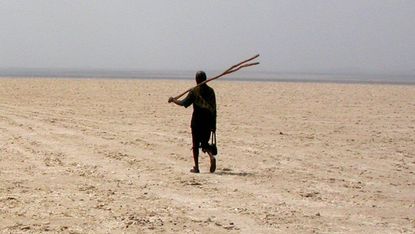Fossil discovery in Ethiopia could rewrite history of human evolution
Scientists believe jawbone dating back 2.8m years belongs to one of the world's very first humans

Scientists in Ethiopia have discovered a fossilised jawbone which they believe could push back the beginning of humankind by almost half a million years.
The 2.8 million-year-old fossil was unearthed in the Ethiopian desert by local graduate student Chalachew Seyoum, who said he was "stunned" by the discovery.
The jawbone that may be a window into the moment humans first emerged . http://t.co/daF3bMHaxH #awesome pic.twitter.com/boWC6ko5nq — Pallab Ghosh (@BBCPallab) March 4, 2015
"The moment I found it, I realised that it was important, as this is the time period represented by few (human) fossils in Eastern Africa," he told the BBC.
Subscribe to The Week
Escape your echo chamber. Get the facts behind the news, plus analysis from multiple perspectives.

Sign up for The Week's Free Newsletters
From our morning news briefing to a weekly Good News Newsletter, get the best of The Week delivered directly to your inbox.
From our morning news briefing to a weekly Good News Newsletter, get the best of The Week delivered directly to your inbox.
The bone, which is the left side of the lower jaw and has five intact teeth, is believed to belong to one of the world's earliest humans. It could shed light on a crucial period of human evolution.
Scientists believe the fossil will help narrow the evolutionary gap between the primitive "ape man" known as Australopithecus afarensis and the more "human" Homo habilis.
"It's an excellent case of a transitional fossil in a critical time period in human evolution," Bill Kimbel, director of the Institute of Human Origins at Arizona State University in Tempe told The Independent.
Homo sapiens, our species, appeared only 200,000 years ago and until this discovery, the oldest remains from the human genus came from the Homo habilis species 2.3 to 2.4 million years ago, according to Reuters.
"By discovering a new fossil and re-analysing an old one we have truly contributed to our knowledge of our own evolutionary period, stretching over a million years that had been shrouded in mystery," said Fred Spoor of University College London.
"The dating of the jawbone might help answer one of the key questions in human evolution," says the BBC's science correspondent Pallab Ghosh. "What caused some primitive ancestors to climb down from the trees and make their homes on the ground?"
Create an account with the same email registered to your subscription to unlock access.
Sign up for Today's Best Articles in your inbox
A free daily email with the biggest news stories of the day – and the best features from TheWeek.com
-
 Nigeria's worsening rate of maternal mortality
Nigeria's worsening rate of maternal mortalityUnder the radar Economic crisis is making hospitals unaffordable, with women increasingly not receiving the care they need
By Harriet Marsden, The Week UK Published
-
 'Elevating Earth Day into a national holiday is not radical — it's practical'
'Elevating Earth Day into a national holiday is not radical — it's practical'Instant Opinion Opinion, comment and editorials of the day
By Harold Maass, The Week US Published
-
 UAW scores historic win in South at VW plant
UAW scores historic win in South at VW plantSpeed Read Volkswagen workers in Tennessee have voted to join the United Auto Workers union
By Peter Weber, The Week US Published
-
 Nigeria's worsening rate of maternal mortality
Nigeria's worsening rate of maternal mortalityUnder the radar Economic crisis is making hospitals unaffordable, with women increasingly not receiving the care they need
By Harriet Marsden, The Week UK Published
-
 Dengue hits the Americas hard and early
Dengue hits the Americas hard and earlySpeed Read Puerto Rico has declared an epidemic as dengue cases surge
By Peter Weber, The Week US Published
-
 How happy is Finland really?
How happy is Finland really?Today's Big Question Nordic nation tops global happiness survey for seventh year in a row with 'focus on contentment over joy'
By Harriet Marsden, The Week UK Published
-
 How Tehran became the world's nose job capital
How Tehran became the world's nose job capitalUnder the radar Iranian doctors raise alarm over low costs, weak regulation and online influence of 'Western beauty standards'
By Harriet Marsden, The Week UK Published
-
 Africa's renewed battle against female genital mutilation
Africa's renewed battle against female genital mutilationUnder the radar Campaigners call for ban in Sierra Leone after deaths of three girls as coast-to-coast convoy prepares to depart
By Harriet Marsden, The Week UK Published
-
 Argentina: the therapy capital of the world
Argentina: the therapy capital of the worldUnder the radar Buenos Aires natives go hungry to pay for psychoanalysis, amid growing instability, anxiety – and societal acceptance
By Harriet Marsden, The Week UK Published
-
 Does declining birth rate spell doom for Britain?
Does declining birth rate spell doom for Britain?Today's Big Question Ageing population puts pressure on welfare state, economy and fabric of society, while fertility is rising on populist agendas
By Harriet Marsden, The Week UK Published
-
 How a new blood test could revolutionise sepsis diagnosis
How a new blood test could revolutionise sepsis diagnosisThe Explainer Early results from ongoing trial suggest faster identification of deadly condition is possible
By The Week Staff Published